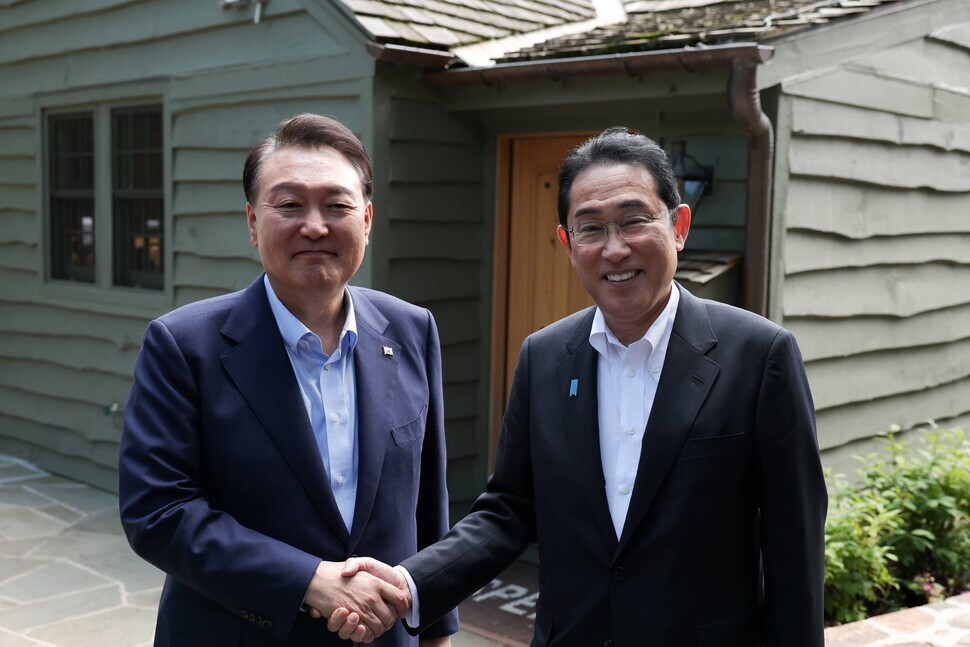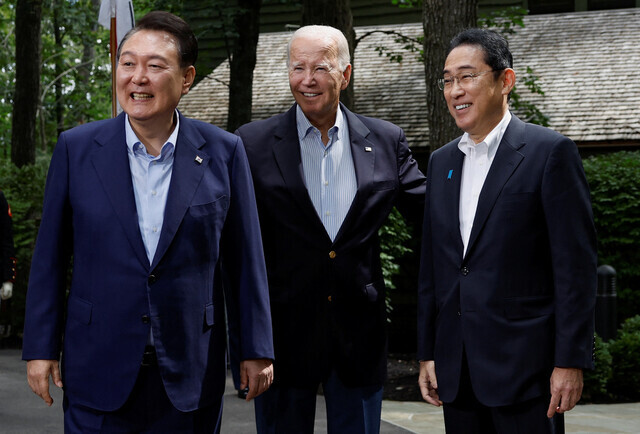hankyoreh
Links to other country sites 다른 나라 사이트 링크
[News analysis] How Yoon overhauled S. Korea-Japan military cooperation in the span of a year

President Yoon Suk-yeol touted last week’s Camp David trilateral summit as ushering in a new era of security and economic cooperation, saying it would bring “fewer risks and more opportunities for our people.”
However, there are growing concerns over the unilateral way the Yoon administration has, after a mere year in office, been pushing for almost alliance-like military cooperation between South Korea and Japan without the Korean public’s consent.
Japan is using the North Korean threat as a pretext for accelerating its rearmament, and the US is trying to make South Korea a junior partner in its system of US-ROK-Japan military cooperation against China.
Security cooperation between South Korea and Japan has been underway for more than 50 years, and it has always been the US that pushed for trilateral security cooperation.
After China successfully tested an atomic bomb in 1964, the US sought to contain China’s military rise in Asia by strengthening trilateral security cooperation. The US supported the establishment of diplomatic relations between South Korea and Japan, which led to the signing of the Treaty on Basic Relations Between Japan and the Republic of Korea in 1965. Then, in 1967, South Korea and Japan began exchanging military personnel.
For three decades, these military exchanges remained rudimentary, with personnel from South Korea and Japanese Self-Defense Forces visiting each other and regularizing troop exchanges.
That changed in 1998 when North Korea launched a ballistic missile, the Taepodong-1. In 1999, the US, South Korea and Japan established the Trilateral Coordination Oversight Group (TCOG) to closely discuss and coordinate policies on North Korea
Since 1999, South Korea and Japan have held biennial search and rescue exercises (SAREX) in the East Sea and in the waters between South Korea and Japan. The drills are noncombatant, humanitarian exercises that build joint response capabilities between the ROK Navy and Japan’s Self-Defense Forces in the event of a ship in distress.
The Park Geun-hye and Moon Jae-in administrations held trilateral exercises with the US and Japan, citing North Korean nuclear and missile threats, but unlike Yoon’s administration, they knew how to pace themselves.
In response to North Korea’s fourth nuclear test in April 2016, the US, Japan and South Korea held their first missile detection and tracking drill near Hawaii that June, and six subsequent drills were held in the Moon administration.
If the North Korean nuclear threat accelerated the trilateral military exercises, the atmosphere of dialogue and the Dokdo and historical issues were what brought them to a halt.
Since 2018, there have been no such drills between the three countries as inter-Korean and North Korea-US relations thawed.

In February and March 2022, the US and Japanese governments repeatedly proposed trilateral military exercises in the waters of the Korean Peninsula, but the Moon administration did not comply, as the drills were seen as a “major shift” in the geopolitics of Northeast Asia, and South Korean society rejected the concept of training with the Japan Self-Defense Forces.
The trilateral security cooperation between South Korea, the US, and Japan that used to focus on maritime search and rescue exercises has expanded significantly since the Yoon administration took office in May 2022, including Proliferation Security Initiative (PSI) maritime interdiction exercises, military intelligence sharing, missile defense warning exercises, and anti-submarine warfare drills.
At a meeting of the three countries’ defense ministers in June 2022, it was agreed to regularize trilateral missile warning drills, missile detection, and tracking exercises.
The three countries held their first-ever anti-submarine warfare drills in the East Sea on Sept. 30 and a missile defense drill on Oct. 6 of last year. It was the first time that the three countries held drills in the East Sea for two consecutive weeks.
This is a far cry from the previous administration, which did not hold trilateral exercises in the sensitive territory of the East Sea, where the Dokdo islets are located. For example, in October 2017, a South Korean Navy ship detected and tracked a North Korean missile in the East Sea, while one US and one Japanese ship shared information off the coast of Japan.
In April of this year, South Korea’s Ministry of National Defense used the phrase “trilateral military cooperation” instead of “trilateral security cooperation” after the Defense Trilateral Talks between the deputy defense ministers of South Korea, the US and Japan. Last week, the three countries’ leaders decided at their summit to carry out trilateral exercises, including missile defense drills, on an annual basis.
Some observers believe that signing an acquisition and cross-servicing agreement will be the final brushstroke completing an alliance between South Korea and Japan. The agreement allows for the exchange of ammunition, food, fuel, transportation, and medical services in the military field in the event of an emergency, and is considered one of the two pillars that would solidify military cooperation between South Korea and Japan, along with GSOMIA, an agreement to share military intelligence. Some observers see the agreement as the basis for Yoon’s recent emphasis on the importance of the seven UN rear bases in Japan.
“South Korea needs to regulate the pace and breadth of trilateral exercises,” said a former diplomatic and security official. “If the current situation continues, South Korea will have less of a say on what happens on the Korean Peninsula, crisis management on the Korean Peninsula will become more difficult, and Japan will be more likely to intervene on the Korean Peninsula.”
By Kwon Hyuk-chul, staff reporter
Please direct questions or comments to [english@hani.co.kr]

Editorial・opinion
![[Column] Tariffs on China: Trump was dumb, Biden dumber [Column] Tariffs on China: Trump was dumb, Biden dumber](https://flexible.img.hani.co.kr/flexible/normal/500/300/imgdb/original/2024/0520/191716191153918.jpg) [Column] Tariffs on China: Trump was dumb, Biden dumber
[Column] Tariffs on China: Trump was dumb, Biden dumber![[Column] What if Seoul took reunification by force off the table? [Column] What if Seoul took reunification by force off the table?](https://flexible.img.hani.co.kr/flexible/normal/500/300/imgdb/original/2024/0520/3017161928630494.jpg) [Column] What if Seoul took reunification by force off the table?
[Column] What if Seoul took reunification by force off the table?- [Editorial] Intensifying US-China rivalry means Seoul must address uncertainty with Beijing sooner than later
- [Column] When ‘fairness’ means hate and violence
- [Editorial] Yoon must stop abusing authority to shield himself from investigation
- [Column] US troop withdrawal from Korea could be the Acheson Line all over
- [Column] How to win back readers who’ve turned to YouTube for news
- [Column] Welcome to the president’s pity party
- [Editorial] Korea must respond firmly to Japan’s attempt to usurp Line
- [Editorial] Transfers of prosecutors investigating Korea’s first lady send chilling message
Most viewed articles
- 1Xi, Putin ‘oppose acts of military intimidation’ against N. Korea by US in joint statement
- 2Kim Jong-un wanted to meet with residents of shelled Yeonpyeong Island in South, Moon recalls in mem
- 3To weigh costs and benefits, Korea must stop treating US troop presence as a sacred cow
- 4[Column] What if Seoul took reunification by force off the table?
- 5Berlin mayor hints at tearing down ‘comfort women’ memorial in city
- 6[Column] Tariffs on China: Trump was dumb, Biden dumber
- 7[Exclusive] Truth commission to seek additional murder charges for figures behind 1980 Gwangju massa
- 8For new generation of Chinese artists, discontent is disobedience
- 9Naver’s union calls for action from government over possible Japanese buyout of Line
- 10[Editorial] Transfers of prosecutors investigating Korea’s first lady send chilling message